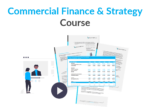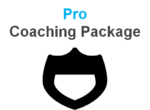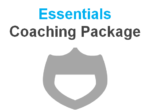
Leaving your Accounting & Audit Career behind | A Step by Step Guide
At this point, and having made it to our blog, you’re likely already thinking about exploring your accounting & audit exit opportunities, perhaps needing to reshape your traditional accounting CV, and ultimately making your move out into more strategic & commercial roles.
Having once been in your position, we’ve since secured many more strategic & commercial job roles (check out our career history here) and now support our countless clients around the world do the same. We know it can be a confusing (and seemingly lonely) time of your life, especially when your only source of reliable information comes from the very peers / work colleagues you are likely competing with for the (seemingly) limited pool or post accounting & audit jobs!
In this post, we’re recommending a structured approach to making your swift exit, which we’ve seen ensures the best chance of success.
We want to help you get the facts and focus your efforts.
It’s no surprise that there is a minefield of dead-end jobs laid out in front of you by job boards and recruiters.
Quite simply, accounting recruiter incentives are at odds with your own personal goals, so they will (often knowingly) misinform you of your genuine accounting exit options in pursuit of their own commission gains. They can be even more relentless if you have experience at a non-Big 4 firm.
Trust us when we say there are FAR more lucrative, exciting opportunities out there than what you’re hearing on the grapevine and you are more than capable of achieving them, based on the bread-and-butter accounting & audit experience already under your belt.
The large majority of newly qualified accountants swarm towards the ubiquitous roles of Transaction Advisory Services (TAS) or Mergers & Acquisitions (M&A), despite not being truly fascinated by “transactions”, nor genuinely understanding what the role consists of, where it can lead or considering any of the other (potentially better) options.
Motivations for moving from Audit to Transaction Services tend to be socially influenced and driven by which roles are considered “cool” in the Finance world, or blinded by the supposedly high salary. However, it’s not uncommon for those already within TAS to loop back to the same question of “Where is my career heading? What do I actually enjoy doing? How do I get there?”.
Yes, of course, the sooner you make a transition away from something you know you definitely don’t want to do for the rest of your life, the better. The thought of doing yet another busy season/year-end cycle is fairly uncomfortable (especially when you see other peers/colleagues making moves around you). You’ll be incentivized to take something … anything … that gets rid of that Sunday-night back-to-work-tomorrow feeling in your belly, and the recruiters swarming around you will be more than happy to give you a few, perhaps ill-judged, ideas.
But – and I can’t stress this enough – the first moves out of accounting & audit matter.
Taking the easy option now might mean avoiding another disastrous “busy season”, but future potential employers will be judging your first steps out of traditional Accounting & Audit as a proxy for your appetite for growth, decision-making, and potential to take on strategic leadership beyond the technical skill-set you’ve built up already.
Your career trajectory will be determined (almost entirely) by what you choose to go into next.
That’s why, we believe taking the time to follow the structured approach we’ve outlined below will save you years of time and hugely increase your chances of:
- Not pigeon holing yourself in a dead-end role
- Not wasting energy on applications that lead nowhere because your CV/Resume is ill prepared
- Not wasting interview opportunities because you didn’t fully comprehend the job description and how it fits in within the wider Finance world
- Not wasting energy debating whether or not to take a job offer in front of you because you only thought about where it could (and couldn’t) lead after applying
- Not having to repeat this process (once or more!) in the near future as you’ve made the wrong decision
- Not deflating future employer perceptions of your high personal growth appetite and valuable skillset by making a wrong move
- Securing a role you’re a good fit for and will progress well in
- Being genuinely excited about your future
So, what are the steps we suggest to help you make your move out of traditional accounting & audit?
We propose 3 very distinct phases to your search and execution of your swift exit:
- The Explore Phase – Establishing the entirety of career options available to you and potential pathways based on the skills & experience you’re sitting on. Start to determine your preferences
- The Experience Phase – Learn what work life is actually like in your preferred area(s) and get prepared to execute
- The Execute Phase – Know how to find & effectively apply to your targeted opportunities & what actions you can take today to get you there.
Taking each phase in turn, we’ll explain why this approach will maximise your chances of success.
Of course, in reality, each of you might find yourself at a slightly different stage in the 3-step process i.e. you may already have some opportunities/interviews in the pipeline and that’s fine.
We’d suggest you continue to pursue any existing leads you might have because nothing beats real interview practice and it’s a great way to better understand new roles from those qualified to talk about them (i.e. the in-house recruiter!).
However, you really must ensure you nail the Explore phase.
By this we mean having a solid understanding of the opportunities and pathways genuinely available to you based on your exact skill set, not just generic advice from a recruiter or your mis-informed peers.
Let’s delve in to Step 1 >>
1. The Explore Phase
(if at all) this phase in any direction (Be honest: how many of you are considering applying to FP&A, TAS, Equity Research AND Asset Management?). This is likely to be an up-hill battle, will result in many unsuccessful applications and is a e ofvaluable to make a solid first-impression with the gate-keepers
As with anything, it’s good to have a solid foundation to build on. Without the fundamentals of Step 1, you simply can’t be efficient or effective in securing the right role. You’ll find yourself riddled with wasted efforts (you’ll be losing out to those candidates who were 100% focused on one of the above career paths), experience nervous interviews, and get frustrated as you spread yourself too thin and Busy Season eagerly approaches!
Knowing and fully appreciating the natural exit opportunities that exist to you determines EVERYTHING else in the process. Without being able to contextualise where you and your current skillset sit amongst the rest of the finance world (and beyond), it’s incredibly difficult to know the full extent of exit opportunities available to you, your route into them and ultimately, where you’re efforts might be best placed for the greatest success.
Only by knowing where you are starting from today, and exactly where you need to get to, can you start to determine the quickest route between A and B.
You can also save a lot of time and energy by knowing where you CANNOT go based on your currently skill set. You can either choose to not focus on such options or take the time to build the required skills.
Nailing this phase is the KEY to getting out of traditional Accounting & Audit as efficiently as possible and into genuinely more strategic & commercial careers that are well-suited to you with ample opportunities for growth.
In fact, you may often revisit this Explore phase as you shape your personal preferences and opinions on various roles & industries.
Where are you now within the landscape?
We all know finance & accounting underpins almost every industry. It’s probably why you joined the profession in the first place.
So have you thought about exactly what the world of finance & accounting looks like and how it interacts with other industries? Do you know where you sit in that landscape?
The first and most obvious place to start is to figure out where your existing role sits within the world of Accounting & Finance. Is it based around technical accounting & reporting? Did you support senior-level decision making? Did you directly influence business growth (whether organic or inorganic)? Have you been working in-industry or advisory?
Knowing where you fit on the spectrum will help you then visualize those options that are both very close to your existing position (and thus are easy to get), and those that are much further afield within a different area. By knowing where you sit relative to such roles, you’ll gain a much better insight as to HOW to present the skills you already have when applying (especially for the latter where it might be more of a stretch!).
Defining where you want to play
More specifically, you probably want to uncover options that suit the related to the skills and experience you’ve gained so far, but which ALSO align with your future goals and ambitions, i.e. if you currently sit in Auditing, a move to Internal Audit might mean a much higher salary, but will not inch you closer to your ultimate goal of becoming the CFO of a high-growth startup (for example).
Don’t worry too much about the time you’ve already spent in a certain sector, industry or role if it’s not where your heart is. As we’ve explained before, traditional accounting & audit can set you up for life, but you need to get out now in order to make best use of your experience in helping you secure the career path that’s more you.
If you spent multiple years accounting for or auditing banks yet you can’t stand the sight of another bank reconciliation or mortgage backed security residual waterfall, then don’t go into anything related to these areas of banking!! Consider the skills you’ve banked from your career so far and how these can be transferable…they most certainly are.
Whilst it may have been a more sure-fired route in the past, becoming a CEO via the Accounting route is a myth (or any other senior role for that matter). It takes insider know-how and very specific effort in knowing exactly where to play to get through the door from a traditional accounting & audit background.
Some recruiters will say you need to do ABC before you can get to XYZ. They might be right that it could help your chances but it’s usually not a requirement. Don’t listen to recruiters that tell you spending “some time” in the sector/role they’re offering (and which you’re really not interested in) is what you “have to do”, especially if you’re not certain that is won’t hurt your future moves.
To help you break through the BS and make your brainstorming easier for you, we’ve gone ahead and done the hard work for you. In our digital Exit Options | A guide to the landscape we map out the post-accounting & audit landscape including all the natural career paths from your existing position in traditional Accounting & Audit … many you’ll probably never have heard of before. You’ll find out:
- how all of the natural careers post-traditional Accounting & Audit all interlink with one another
- which roles are likely to pigeon-hole you
- which roles are genuinely “strategic” or “commercial” and can help you in your journey to more lucrative career paths
- which roles you have the best chances of getting
- which roles/areas will find your accounting & audit background highly valuable
- an insight to the work-life reality of a multitude of interesting careers/roles
- Differences between in-industry & advisory options
- how your previous audit/accounting experience can be invaluable in helping you land such roles (i.e. in helping you in your applications & interviews)
We also discuss all the skills you’re already sitting on (likely without even knowing it) that are in high demand and give you ideas on where they are typically highly valued outside of your existing accounting & audit bubble.
If this is of interest feel free to use “ExitOptionsLoyalty20” for a discount at checkout! Find out more here >>> Exit Options | A Guide to the Landscape.
2. The Experience Phase
So now you’ve fully grasped Phase 1 you will understand where you’re current position sits amongst the wider finance world (and beyond), the full extent of exit opportunities available to you and where each of those roles can all lead.
This next Phase 2 is all about gaining an inside-out genuine understanding of the work-life reality of your preferred role/area(s) and understanding which hurdles (if any) you might need to jump over.
This will help you start to focus on building on your areas of strength and weakness on your CV/Resume.
This needs to happen BEFORE you send out any applications or have any “informal chats” with those judgey recruiters.
When considering your position vs other applicants, don’t get disheartened and lose confidence in your own abilities. Yes, there’s heaps of competition in the financial world in general, but you’ve already proven your worth by getting to where you are now and there are many tried-and-tested ways that you can continue to stand out.
Your CV/Resume is NEVER “complete” and you always have time to revamp the areas you need to whether it’s through hustling for some extra experiences & activities in your spare time or adequately highlighting and honing in on the areas of the experience you already have and which employers are desperately searching for.
You can make as big a move as you’re willing to hustle for.
Remember, you also don’t need to have had 100% of the experience or skills listed in job spec to successfully secure it and do the job well. In fact it’s better for both the employer and yourself if that’s not the case … that means there’s room for you to grow and become a more engaged employee.
This is a big misconception on both sides.
When deciding on a role you should most definitely be considering what’s in it for you, as well as the employer. Your training and hunger for personal development never ends so be sure that the next move compliments your growth appetite.
As I mentioned before, bear in mind that future employers will judge your growth appetite, future potential, and abilities by looking at the first move you made out of the structured road to qualifying in accounting & audit … so make the choice carefully.
It might seem counter-intuitive, i.e. holding off applying to any jobs to focus on blue sky thinking of “what you want” and analyzing how your CV/Resume might be perceived by others. Yet this is guaranteed to save yourself time and energy later by putting in the groundwork now on Phase 1 & 2 (particularly Phase 1!).
3. The Execute Phase
This final phase is all about executing on the solid foundations you’ve laid out in Phases 1 & 2. It’s about understanding how to best approach your applications and interviews for that leap into more strategic and commercial roles.
How to shape your traditional accounting & audit CV/Resume line-by-line obviously depends a lot on the role in questions, so we’ll stick to the general mantra and approach in this post.
Know your audience
Consider how any of your previous experience might be perceived by others OUTSIDE your current work life bubble. For example, whilst you might be squabbling over which out of the Big 4 is the most prestigious to work for, nobody outside of accounting gives a flying f*ck.
Honestly, all of the Big 4 are considered prestigious, and even below the very top of the accounting league table sits some very well respected accounting firms. So you can forget any insecurities you’ve been harbouring about whether and whom you work for.
As a qualified accountant, regardless of the means by which you got there, outsiders will still consider you as someone who is intelligent, can understand complex scenarios and support high-powered decision-making, and can work under high pressure. Use these perceptions to your advantage.
Have a little mystery about you
In your applications and interviews, you don’t need to regurgitate absolutely everything you’ve ever accomplished. Being slightly mysterious (in the right places) can help you come across as intriguing, enticing the reader (gatekeeper) into wanting to call you up for an interview. It can also open up more conversation once you get to any potential interview. It creates an impression that there’s so much more than you could possibly share in a couple of pages of A4.
Be bold
You can certainly convince a prospective employer you’re suitable for a role even if you only have 50% of the experience or skills listed as a requirement on the job application. After all, companies take fresh school and graduate recruits who have 0% of the experience and skills with the notion that they have “potential” that can be developed. This is what you want to tap in to.
Stop with the technicalities
Similarly to the above, people outside of your exiting work-life bubble will not understand (or care for) all of the niche acronyms and technical accounting terms you have become so accustomed to using.
It’s a very common mistake we see all the time with our clients … listing all the niche acronyms and specialist finance areas you’ve worked within in order to sound intelligent. Sure, you might look incredibly technical in your accounting abilities, but this is often so much so that you no longer look like you’re a good fit for working with “strategy” people (who like to do blue sky thinking rather than be stuck in the weeds of technicalities)
You want to come across as someone that is inherently comfortable with the technicalities (your qualification does this for you), whilst being able to explain in clear, plain English how such analysis affects strategic decision-making.
You’re already technical by nature of being accountant, so avoid emphasizing many further technical aspects unless they explicitly match the prospective role you’re going for.
Getting out there
Once you’ve worked on buffing up your CV/Resume, Cover Letters/outreach emails and you’re confident you portray yourself as more than just “The Accountant”, you’ll of course want to get in front of the right people at the right time.
There are many ways to approach this and below are the main ones we see in order from least to most likelihood of success:
- Networking via cold emails/calls
- Job boards
- Specialised recruiters (e.g. in a particular field such as Asset Management)
- Applying directly to opportunities listed on company websites
- Applying to companies directly via email when no jobs are advertised (yes, this does work…a lot!)
- Networking via an introduction (recommended over cold emails/calls)
You can certainly spend a good chunk of your spare time simply applying to roles, reaching out for, as well as arranging and attending meetings. Given that we all have limited time to make every single application PERFECT, and Busy Season is fast approaching, this is exactly why we recommend you focus your efforts on a particular field or set of roles that are similar enough that you can tailor your CV/Resume PERFECTLY to them and outreach in the right channels accordingly.
I can’t tell you how many TheSwiftExit clients tell us they’re applying for Corporate Finance, Transaction Services, Equity Research AND Financial Planning & Analysis (FP&A) all at once. So many applications will be ill-prepared if you follow this same approach as each role involves differing responsibilities & skills, they all lead down different career paths and all require a different approach to best help you secure the role straight from traditional Accounting & Audit.
Without focus, your chances of rejection (or getting no response at all) are much greater.
Just like we can, employers and recruiters can sniff out when someone doesn’t fully appreciate the responsibilities of a role they’re applying to and are more likely to try and convince you to pursue their other LESS strategic roles on offer if they think you’re none the wiser. It’s also SO easy to stand out if you can do this simple task well.
Wrapping up
Everyone has their own appetite for risk and what they might consider a successful next move to be. It’s okay to take a wrong turn or a career path that you go on to find doesn’t suit you as well as you’d thought.
But what if you could avoid wasting time on such moves? What about the salary and career progression you are forgoing by making a dud move.
The VAST majority of our clients and readers could do with spending much more of their time in the “Explore” stage.
Your next move (wherever you are in your career) should be sufficiently well-researched to reduce the chances of pigeon-holing yourself deeper into the trenches of traditional Accounting and Audit.
Without being able to contextualise where traditional accounting & audit (and your current skill set) sit amongst the rest of the finance world, it’s incredibly difficult to know the full extent of commercial and strategic exit opportunities available to you, and your route into them.
The foundations of our client success stories are built on nailing the “Explore” phase. It’s why we started TheSwiftExit.com in the first place.
Having been there before, we knew that there was absolutely no sufficient or objective guidance out there to rely upon when making one of the most important decisions of your career.
We’re so happy you found us!
Alongside our numerous other blog posts and Coaching Services, we’ve combined our research, experience, and the advice we’ve given countless successful clients to create the Exit Options | A Guide to the Landscape, an independent & unique insight into the post-traditional accounting and finance career landscape.
Don’t forget to use “ExitOptionsLoyalty20” for a discount at checkout!
Find out more >>> Exit Options | A Guide to the Landscape.
Want to land (and master) more strategic and commercial roles?
Learn how to upskill beyond your technical accounting & audit background in the first (and only) online course built specifically for accountants. Through interactive modules, case studies, and real-world applications, you’ll learn how to confidently build financial models, assess business opportunities, and everything else needed to contribute meaningfully to strategic decision-making. Build hard commercial skills to future-proof your skill set and prove you can translate your accounting background into a commercial context with the Commercial Finance & Strategy – Principles and Execution online course.
Spice up your CV/Resume for the post-accounting & audit world
We’ve created a digital guide specifically to help those of you applying for more commercial & strategic roles. Our straight-talking CV/Resume advice for Accountants/Auditors is the only guide that is highly-specific to the traditional accounting & audit background: we give you real-life good & bad examples for showcasing your experience for strategic roles, the best structure & content to win over recruiters, a strategy for distributing your CV/Resume, interview advice, and more!












thank you for giving me wonderful information